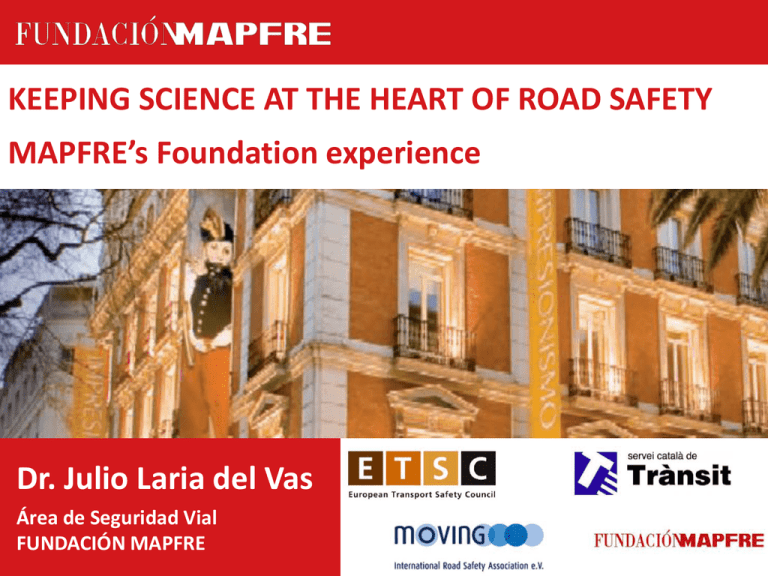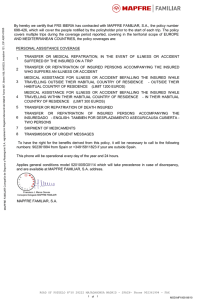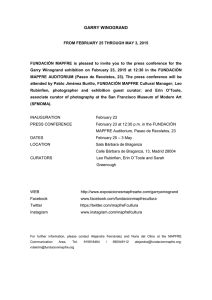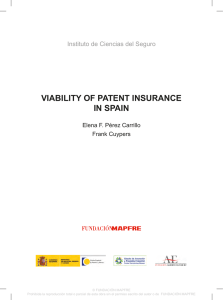Research in MAPFRE Foundation
Anuncio

KEEPING SCIENCE AT THE HEART OF ROAD SAFETY MAPFRE’s Foundation experience Dr. Julio Laria del Vas Área de Seguridad Vial www.fundacionmapfre.com FUNDACIÓN MAPFRE 1 MAPFRE Foundation Created in 1975 by MAPFRE GROUP Purposes To improve the quality of people`s life. To encourage a wider appreciation of culture, arts and humanities. To promote training and research in topics related to insurance and retirement planning. To improve the economic, social and cultural conditions of the most disadvantaged people and sectors of society. To promote the safety of people and their assets, with a special focus on road safety. 2 MAPFRE Foundation Prevention and Road Safety Insurance Science FUNDACION MAPFRE Social Action Health Promotion Culture and History 3 Road Safety Activities • Education and awareness activities (both physical and digital) • Support to national and international (ETSC) projects • Road Safety Advocacy Children (0-8 years) Kids (9-14 years) Young (15-25 years) Adults (25-65 years) Elderly (+ de 65 years) 4 Road safety international activities 17 11 10 20 18 14 8 9 19 12 22 3 13 5 7 6 2 16 1. Argentina: Educational activities for children. Programs: Companies and doctors Institutional Colaboration: EISEVI Research: Vehicle factor 2. Brasil: Educational activities for children Programs: Companies and Senior Citizens Research: Road Education in Brasil 15 1 4 3. Costa Rica: Educational Acticvities for young people Research: Costa Rican Drivers 4. Chile: Educational activities for children and young people Programs: Children Car Seats 5. Colombia: Educational activities for children and young people Research: Pedestrian behaviours and accident risk Institutional colaboration 21 6. Ecuador: Educational activities for children Programs: Companies 12. Nicaragua: Educational activities for children 7. Philippines: Educational activities for children 13. Panama: Educational activities for young people Programs: Children Car Seats and companies 8. Guatemala: Educational activities for children and young people 9. Honduras: Educational activities for children Institutional Colaboration 10. Malta: Media program 11. Mexico: Educational activities for children and young people 14. Puerto Rico: Educational activities for children 18. Dominican Republic: Educational activities for children and young people Institutional Colaboration 19. El Salvador: Educational activities for children Media program 15. Paraguay: Educational activities for children and young people 16. Peru: Educational activities for children Programs: Road Safety in companies 17. Portugal: Educational activities for children and young people Programs: Children Car Seats , Companies and Senior Citizen 5 20. Turkey: Program: Companies Media program 21. Uruguay: Educational activities for children Programs : Companies 22. Venezuela: Media program Definitions Ciencia • Conocimiento cierto de las cosas por sus principios y causas. Política • Arte, doctrina u opinión referente al gobierno de los estados Conjunto de conocimientos obtenidos mediante la • Actividad de los que observación y el razonamiento, rigen o aspiran a regir sistemáticamente estructurados los asuntos políticos y de los que se deducen principios y leyes generales Source: www.rae.es 6 Cuatro cosas no pueden esconderse durante largo tiempo: la ciencia, la estupidez, la riqueza y la pobreza Averroes 7 Los accidentes de tráfico: problema auto-regulado Teoría de la Compensación del Riesgo • El único factor que puede producir cambios duraderos en el número de accidentes y a largo plazo son los cambios en la intensidad del deseo de la población de disfrutar de una mayor seguridad. Cuanto más fuerte sea el deseo de prevenir accidentes más decididas y contundentes serán las medidas cuya puesta en marcha resultará aceptable. Gerald Wilde 8 Role of Science Based on research data and outcomes • Identify road safety problems • Prioritize road safety problems • Identify solutions • Prioritize solutions • Evaluate solutions Explain “how to” and “why” 9 Ingredients of Science • • • • • Research Dissemination explain the goals Training Resources Dialogue understand the needs 10 Research • • • • • In-house research Regional National European International 11 Research 100 México 90 80 Brasil 70 60 50 España 40 30 Argentina 20 10 Chile 0 ABS Distribución electrónica de frenada ESP Servofreno de emergencia • An average of 15 years in “installing” the research outcomes in cars • PIVE (Fleet renewal scheme based on CO2 and consumption) 12 Research in MAPFRE Foundation • Vehicle safety equipment • Use of child safety seats • Viability of child safety seat legislation in LAC • Road and street infrastructure: the elderly road user perspective • Elderly pedestrian crashes • Cyclist head injuries and helmet effectiveness • Needs in the post-crash response (pillar V) in LAC 13 Dissemination • Technical/scientific publications (online) • Workshops, seminars, roundtables, lectures, conferences, congresses, webinars… • Press releases (as amplifier and education means) • Ensure that we reach the entire population 14 Dissemination in MAPFRE Found. • Seminars • Press releases • Online repository of studies, resources… • Translations – Spanish version of the “Handbook of Road Safety Measures”… and a new version in Portuguese being prepared 15 Dissemination in MAPFRE Found. 16 Training • Road Safety courses in upper education • Number of MS and PhD degrees in Road Safety: Vehicle Safety, Road Desing, Human Factors… • Vocational training (trainign for professionals) • Enormous opportunity to make in-house research in companies with the objetive of reducing work-related crashes (ISO 39001) 17 Training in MAPFRE Foundation • • • • • • • Road Safety Inspections Road Safety Plans Road Safety in the classroom Teaching techniques for road safety trainers Advanced course on Road Safety Road safety in the work environment Prevention in Road Safety through Health 18 Resources Resources: Human Budget (€) Goal prioritization Institutional coordination Collaboration 19 From Science to Policy Science Leadership Dialogue Priority goals Social & technical acceptability Opportunities Negotiations Institutional coordination Policy 20 21 From Science to Policy • Source: Handbook of Road Safety Measures (Elvik et al.) Política Ciencia 22 Training in MAPFRE Foundation El conocimiento es aquello necesariamente verdadero (episteme) En cambio, la creencia y opinión ignoran la realidad de las cosas, por lo que forman parte del ámbito de lo probable y de lo aparente. El conocimiento científico no debe ser válido desde el punto de vista lógico, sino también debe ser probado mediante el método científico o experimental. Platón 23 Practical case 1: use of science in the urban cyclist helmet debate in Spain • An initiative of DGT • Then: – The injury-perspective – The healthy living style perspective combined with the “denial” position (it wouldn’t have been ethical otherwise) • No one was able to reconciliate both positions • At the end, a compromise decision was taken: up to the age of 16 years 24 Practical case 2: change in BAC limits in Centro America in 2014? • Early in 2014, it was proposed to raise the BAC limit with the intention to “motivate commercial drivers” • MAPFRE Foundation quickly reacted and sent a note summarizes key pieces of “science” – Organización Panamericana de la Salud (2010). Beber y conducir: Manual de seguridad vial para decisores y profesionales. Washington, D.C.: OPS, © 2010. ISBN: 978-92-75-33125-5 (http://www.who.int/roadsafety/projects/manuals/alcohol/drinking_and_drivingspanish.pdf dirección de internet consultada por última vez el 27 de noviembre de 2013). – Elvik, R., Høye, A., Vaa, T. y Sørensen, M. (2013). Manual de Medidas de Seguridad Vial. Título original: The Handbook of Road Safety Measures. Second Edition. Instituto de Economía del Transporte, Oslo (Noruega). Segunda edición en castellano editada por FUNDACIÓN MAPFRE (actualmente en imprenta). ISBN: 978-84-9844-448-3. – Consejo Europeo de Seguridad en el Transporte (2012). Alcohol y conducción: hacia la tolerancia cero. Bruselas Bélgica. Título original: Drink Driving: Towards Zero Tolerance. European Transport Safety Council (ETSC) (http://www.etsc.eu/documents/Drink_Driving_Towards_Zero_Tolerance.pdf dirección de internet consultada por última vez el 27 de noviembre de 2013). El proyecto fue paralizado 25 Is all science trustworthy? 26 Is all science trustworthy? 27 Future challenges (topics) • How to translate research into policy • Evaluation (in particular in education/training/awareness…) • International joint activities • Barrier identification and solutions • Road user acceptability of measures • Synergies with other policies: health (care and promotion), environment, transport, education… • Spanish leadership of research: – References in the “Handbook of Road Safety Measures” • TOI – 1963 • SWOV – 1970 • Consejo Danés para la seguridad vial - 1969 28 Alternatives to policy/legislation • Leadership with examples: – Active and passive safety systems – Good practices • Support to R&D (to show “it can be done”) • Public procurement 29 Future challenges (other aspects) • Increase the dialogue between actors: the “is anyone there?” feeling… • Research quality metrics. We should measure the quality of research (quality stamp) • Pedagody for politicians • Reinforcement of the dialogue • Avoid complacency / fatalism • Greater visibility of DGT research programme • Greater transparency and dissemination of the research findings • Be careful of the “experts” 30 Keeping science at the heart of road safety policy-making 31 The end of the way: Zero Vision / Goal 1. Nadie puede resultar fallecido ni sufrir graves secuelas 2. La seguridad es un PRErrequisito irrenunciable de la movilidad 3. El enfoque tiene que ser sistémico: persona, vehículo, vía, entorno… Source of the drawings: SNRA Thank you very much for your attention www.fundacionmapfre.org 33


